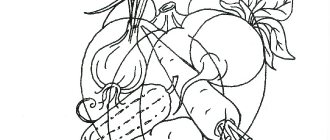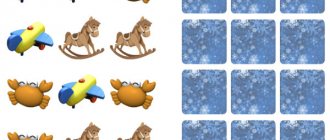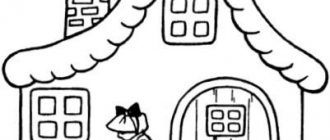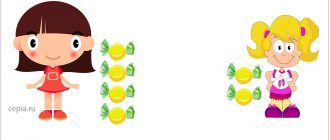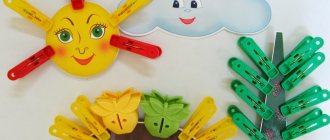Preschool age is an important period in a child’s life, since at this time there is an active development of intelligence, mental processes, and personality traits. Therefore, parents need to be extremely attentive to preschoolers so as not to miss significant developmental moments. Of particular importance at this age is the formation of memory, such processes as memorization, preservation and reproduction of information, which is necessary for further successful learning at school. How should parents act in order not to miss anything important in the development of a preschool child, and to understand how to develop a child’s memory?
Train your memory, attention and thinking online with Ikyusha
Go to classes
While developing these processes, many parents, unfortunately, forget about the importance of:
- A complete balanced diet. Diversify your child’s menu by including the necessary vitamins and microelements for proper brain function.
- Sports activities. When a child moves little, his blood is not sufficiently saturated with oxygen, and fatigue appears. This way the baby gets tired faster. If physical activity is contraindicated, just spend more time in the fresh air, taking evening walks with the whole family.
- Have a healthy sleep. Lack of sleep has a bad effect on children's brain activity and memory. Attention becomes distracted, the child becomes uncollected and lethargic.
Remember that first of all you need to create comfortable conditions for children, and only then start learning.
What other points should you consider before starting classes?
- Classes must be regular. Systematic repetition of exercises is the main key to success.
- The duration of the lesson should not exceed 10-15 minutes. Otherwise, such games and exercises will become boring, and the need to repeat them will cause negative emotions.
- Don't force your child to study if he doesn't want to. Turn the lesson into an exciting game, then your baby will always be in a great mood and want to repeat the exercises again and again.
- It is important to gradually increase the difficulty of the training if you want to see progress in children. Slowly add new ones to well-known exercises or complicate your child’s favorite tasks.
There are many different exercises and games to develop children's attention, thinking and memory. We have selected the most interesting and effective ones for you and distributed them by age. Ready to get started?
How to train visual memory of preschool children?
After the examination, it will be easy for parents to assess the level of visual perception in their preschooler and select educational games or exercises for home activities. The main thing is that they must remember the features of carrying out exercises for the development of a child:
- Tasks must correspond to the level of development, their complexity increases gradually.
- The lack of arbitrariness of the child’s actions is taken into account, so during training it is necessary to interest him in game techniques, competitive moments, and prizes.
- The tasks must be understandable to children; for this purpose, instructions are given in simple, accessible language.
- To get the best results when training visual memory, it is necessary to use auditory sensations and motor skills.
Games and exercises to develop attention
Exercise “Tangled Lines”
Age: from 3 years
The essence of the exercise is to follow the tangled line from start to finish. You can draw such lines yourself, or you can use ready-made labyrinths. This exercise perfectly develops concentration and perseverance.
Game "Search"
Age: from 3 years
You show your child pictures of objects, among which you need to find a special one that is different from the rest. It may be a different size, shape or color. Gradually complicate the task: ask to find the desired pattern, which stands out only with a small detail. Step by step increase the number of unique items.
Children of all ages love these games. Practice finding differences in our exercise.
In addition to entertainment, object search tasks develop voluntary attention, increase its concentration and increase its volume.
Game "Find the odd one out"
Age: from 4 years
The task is simple - you read a short text to the child, and he claps if he hears inappropriate, “extra” words. For example, three birds were sitting on a branch: a bullfinch, a tit and a monkey. The boy Vitya flew nearby. He heard the birds quack and stopped, their singing sounded so beautiful!
You can come up with your own funny stories or simply replace the words in your child’s favorite fairy tales. The game “Find the odd one out” increases children’s concentration and intelligence, and also improves auditory memory.
Game "Where are the mistakes?"
Age: from 5 years
Prepare in advance a picture in which mistakes were made. For example, in a picture of a winter landscape, draw a beach umbrella, a fan and a hat. The number of errors depends on age: for five-year-olds, 5-6 are enough. For older children there should be more mistakes.
Systematic searches for errors make attention more stable, increasing its concentration.
Game "Numbers"
Age: from 5 years
The adult shows the child a series of numbers that must be remembered in the same order. For example, 1, 2, 3, 5, then 2, 4, 6, 8, 1 and so on. The older the baby, the longer the row can be, but usually it does not exceed 7-8 digits.
The game expands the attention span and develops auditory memory, and also teaches you to analyze and group objects (numbers).
Game "Let's start charging!"
Age: 4-6 years
Let's do some exercises? But not the usual one, but a special “attentive” one! The presenter names the parts of the body and shows them on himself, and the children repeat them. Then the adult begins to confuse the kids, calling one thing and showing another. The child who makes the least mistakes wins.
This fun game develops voluntary attention, auditory memory and motor coordination.
Perform developmental exercises from Ikyusha
Mathematics
Reading
The world
Logics
English language
Anagrams
Age: from 5-6 years
Anagrams are the rearrangement of letters in a word to form a new word. For example, sleep is nose, rakask is paint. Anagrams work well for children who can already read.
Such tasks increase concentration and speed of thinking, and also develop visual memory.
Schulte tables
Age: from 5 years
Many parents have heard about Schulte tables. These exercises are very popular as they increase concentration and develop memory in a light playful way. The child’s task is simple - to find in order the numbers or letters randomly located in the table. The sizes of the table vary depending on the age and preparation of the baby (usually from 3x3 to 16x16).
Exercise “Listen and count”
Age: 6-8 years
Another great exercise for focusing attention. You read the sentence while tapping your pencil or pen on the table. The child needs to remember both the text and the number of your strokes. If the baby begins to cope easily, complicate the task by gradually increasing the number of blows.
Features of memory in preschool children
A child's memory needs a special approach. Features of perception and memorization of information depend on the age period.
Preschoolers can be divided into several age groups.
- From 1 year to 2 years, the baby’s nervous system improves, and after 2 years, visual memory predominates. The first memories associated with visual factors arise.
- From 2 to 4 years old, a child works with mechanical memorization of details of the surrounding world, repeating words and actions after his parents. Motor memory also improves.
- From 4 to 6 years old, a preschooler begins to rely on involuntary memory based on personal impressions.
It is difficult for preschoolers and first graders to direct their willpower to memorize. Involuntary memory based on novelty dominates. Knowledge is best perceived by a child through direct contact with the teacher. One of the main tasks at this age is to improve voluntary, conscious memory.
Figurative and emotional memory become leading. Through these channels of perception, the child will learn the basics of mathematics, languages, and natural sciences. You cannot completely rely on emotional memory: in a stressful situation, children will not be able to reproduce acquired knowledge, because the sphere of feelings will be inhibited.
Teachers and parents should gradually introduce exercises into the lesson program to develop logical, figurative memory. This is exactly what adults have. However, you shouldn’t forget about other types either.
Games and exercises for memory development
Memory Game
Age: from 3 years
This is one of the most famous and favorite memory development games for children. Otherwise it is called “Find a Pair”. The game is a set of paired pictures with the same designs: for the little ones it is usually 12 cards (6 pairs), for older children the number increases. The idea is simple - find identical pairs from the total number of cards lying face down. If the cards match, the player takes them, if not, returns them back.
There are a lot of both paper memories and online games. Ikyusha also loves such exercises, try to find the pairs faster than him?
Game "What's gone?"
Age: from 3 years
An excellent game for developing visual memory and increasing attention span, which does not require additional materials.
Place 4-5 toys or small objects in front of your child for a minute and ask him to turn away. Then remove one item and ask what is missing? The kid must name what is missing. If the game is boring, diversify it by adding a new item.
The task must be gradually made more difficult, increasing both the total number of toys and those that we add or remove. Focus on the child’s age: for example, by the age of 6-7 years, a child can easily remember up to 10 objects.
Choose a pattern
Exercise “Fold the pattern”
Age: from 4 years
Make a pattern or lay out a drawing from simple geometric shapes (can be cut out of cardboard) or construction set parts and ask your child to remember it. Then the child needs to turn away for a while, and during this time you change the location of one figure or part. The baby’s task is to find changes and restore the pattern.
At first you can start with 3-4 parts, gradually increasing their number. If the child can do it easily, remove several parts or all at once, asking him to reassemble the pattern.
This exercise develops memory and imagination, increases the volume and concentration of attention.
Choose a pattern
Game “Remarkables”
Age: from 5 years.
Ask your child to close his eyes and list everything he saw in the room, indoors, outside. The more small details he remembers, the better! Ask your child leading questions if it is still difficult for him to answer. For example, how many children play in the sandbox? Did the cashier at the store have long or short hair? How many cups were there on the table?
Game "Locomotive"
Age: 4-7 years
This is a very fun and entertaining game for a small group of children. The idea is simple - the first child names any object, the next player repeats the word and names his own. The third child repeats what the first two said and adds himself, and so on.
“Locomotive” helps to increase memory capacity, develop auditory perception and voluntary attention. You can also consolidate the material in this way, for example, by naming only fruits, vegetables, trees, flowers.
Tag
Age: from 6-7 years
The last of our selection, but one of the most famous games! Tags are a square board with 16 identical square sections inside. 15 of them contain dominoes with numbers from 1 to 15, which are located randomly in the box. The player's task is to place them in the correct order, moving from top to bottom and left to right.
The game perfectly develops memory and logical thinking. Are you ready to play yet?
Whatever game you choose, they will all bring the desired result only with systematic training. Include these tasks in your list of regular tasks and soon you will notice how your child will become more collected and attentive, it will be much easier for him to remember and retain the necessary information in his memory. And most importantly, this will happen very naturally and unnoticed in the process of fun and exciting activities.
